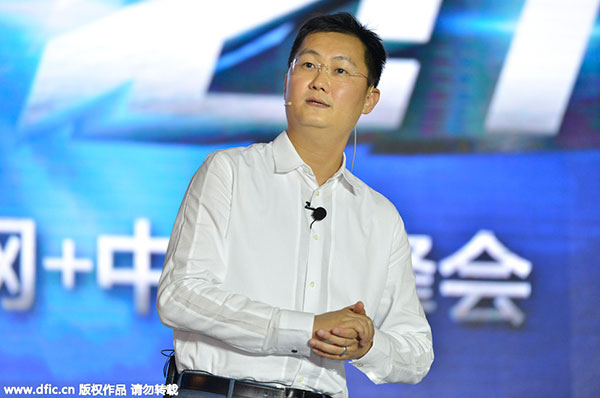 |
|
Ma Huateng, chairman and CEO of Tencent Holdings, delivers a speech at a summit in Beijing, April 29, 2015. [Photo/IC] |
Ma Huateng, founder and CEO of Tencent Holdings, will make five suggestions at the National People's Congress annual session opening on Saturday, including those concerning development of the sharing economy, Internet-based medical services and security of the Internet ecosystem.
The sharing economy will become a new, strong driving force in China's economic growth and will help push the service industry as the main engine for China's economy, said Ma, an NPC deputy whose company is China's largest and most used Internet service portal.
The market size for the sharing economy in China surpassed 1 trillion yuan ($152.8 billion) in 2015, while the sharing economy in the United States had a market size of more than 3 trillion yuan and occupied 3 percent of the US GDP last year, Ma said in his suggestions.
"The sharing economy still has considerable room for development in China," Ma said.
He cited several problems that are restricting the development of the sharing economy in China, including the need for an improved credit investigation system and better Internet infrastructure.
"The supervision of the sharing economy is still the same as that of traditional industries, which makes it difficult to innovate," he said.
Tencent, a Shenzhen-based Internet giant, is active in the country's "Internet Plus" campaign. It signed strategic cooperative agreements with 45 cities in 13 provinces and autonomous regions across China last year to help them transform their economic development through big data, cloud computing and other technologies.
"In the ‘Internet Plus' age, we face more challenges in terms of information security. Traditional means are not updated enough to crack down on the changes and increase in cyber crimes. China should build a security system to protect the mobile Internet ecosystem," Ma said.
As for the suggestion concerning Internet-based medical services, Ma recommended that healthcare authorities encourage IT companies to participate in the development of graded diagnosis and treatment services in China.
"With remote education and remote medical care via the Internet, we can strengthen medical training and cultivate more reliable doctors at the grassroots level," Ma said. "We should, especially, get the doctors at the grassroots level into the habit of using mobile medical devices to monitor the health conditions of middle-aged and elderly people."
To optimize the allocation of medical resources, Ma advised the government to remove the "hidden obstacles" that prevent doctors from becoming freelancers.
He also proposed the establishment of a system for electronic health records, optimized for mobile Internet technologies, so that individuals and hospitals both have convenient access to information.
